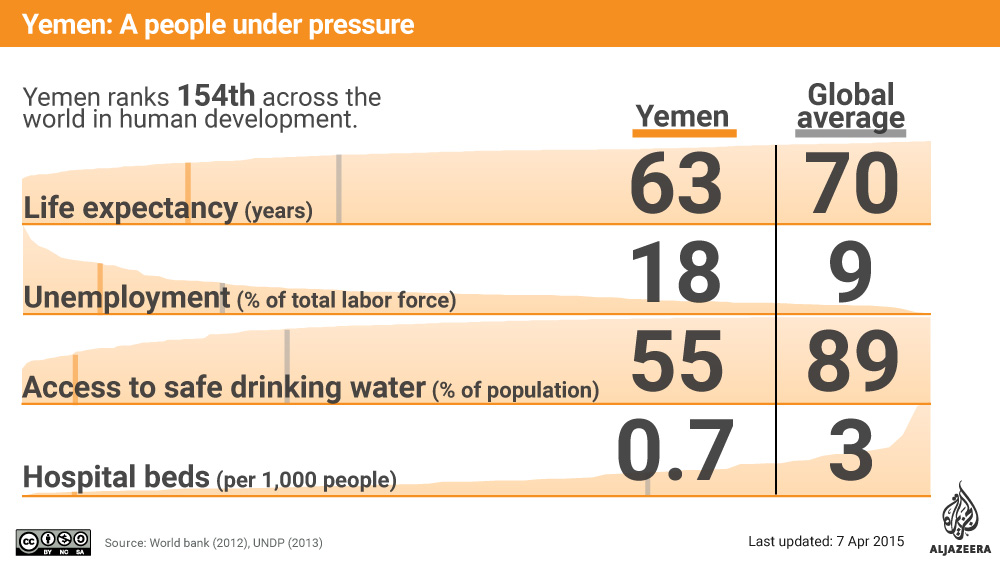UN says fuel shortage threatens relief work in Yemen
UN agency calls on Houthis to release fuel supplies, saying it needs 200,000 litres of fuel to distribute its food aid.

The UN has said relief operations in Yemen could end “within days” unless Houthi fighters, who control much of the country’s fuel supplies, allow distribution of the much-needed resource.
UN chief Ban Ki-moon said on Friday that a lack of fuel was preventing aid agencies on the ground from distributing crucial supplies “making the already catastrophic humanitarian situation in Yemen even worse”.
Keep reading
list of 4 itemsHouthis say they will target Israel-bound ships anywhere within their range
How will Iran respond to Israel’s attack on its Damascus consulate?
US sanctions shipping firm accused of links to Iran, Yemen’s Houthis
Humanitarian operations will end within days unless fuel supplies are restored
“Humanitarian operations will end within days unless fuel supplies are restored,” Ban warned.
The World Food Programme (WFP) said it was in urgent need of more than 200,000 litres of fuel to be able to continue distributing food supplies already in its warehouses.
Despite more than a month of air strikes by a coalition of Arab states against the fighters, the Houthis have continued their advance into the south after reportedly being backed by military and security forces loyal to ousted President Ali Abdullah Saleh.
The WFP, which has stocks that can feed 1.5 million people for one month, said most of the roads connecting the capital, Sanaa, to the governorates of Aden, Taiz, Ad-Dali’, and Lahj were “becoming gradually inaccessible, making the delivery of life-saving medicines a serious challenge”.
It also warned of rising numbers of cases of acute respiratory infections, acute diarrhoeal diseases, and malaria.
Related: Humanitarian crisis of immense magnitude looms in Yemen
The agency said it had received 44 alerts of suspected disease outbreaks, including measles, dengue fever and meningitis.
Severe shortages of medicine and health staff were also being reported in areas where the violence was raging, and shortages of safe water were becoming acute across much of the country, it said.
According to the UN, 12 million people are “food insecure” or going hungry, a 13 percent increase since the conflict started.
In a surprise move, Russia called an emergency meeting at the UN Security Council on Friday, pushing for the delivery of diesel fuel and a pause in fighting.
|
|
Russian Ambassador Vitaly Churkin told Al Jazeera he was “very concerned” by the crisis and said with hospitals relying heavily on diesel fuel for their operations it was important for the UN to prioritise the delivery of fuel.
However, Churkin’s call for a humanitarian pause was not backed by other members of the 15-member council.
Meanwhile, the World Health Organisation (WHO) said fighting and air strikes had killed 1,244 people and injured 5,044 between March 19 and April 27, according to a latest toll.
The WHO, which receives its statistics from health facilities, said the real numbers were probably higher since many people were not making it to hospitals for treatment.
Analysis: The man who could save Yemen
The air strikes, which began on March 26, are aimed at diminishing the capabilities of the Houthis who have overrun Sanaa and several other key cities and restoring the authority of President Abd-Rabbu Mansour Hadi.
Air strikes on Friday hit military sites on the outskirts of Sanaa, and the al-Dailamy military airport in the north of the capital.
Residents told Al Jazeera that at least 21 civilians, including seven children and two elderly persons were killed after an air raid flattened nine homes in the residential neighbourhood of Bab al-Shaab.
Warplanes also targeted several Houthi positions including Hodeida, Taiz, Amran, Marib and the Houthi stronghold of Saada.
In the coastal city of Aden, air strikes and clashes killed 47 people as the Red Cross scrambled to evacuate staff and patients from a hospital when it became a front line.
In the city’s Dar Saad district, at least two civilians were killed and seven others injured by Houthi shelling on residential areas.
Sources told Al Jazeera that Dr Haifa Al-Zawqari, a prominent figure opposing the Houthis, was among those killed and her children seriously injured.
The Houthis, whose stronghold is in the country’s northwest, have refused to withdraw from territory they have seized, in defiance of a UN Security Council resolution imposing an arms embargo and sanctions on their leaders.
